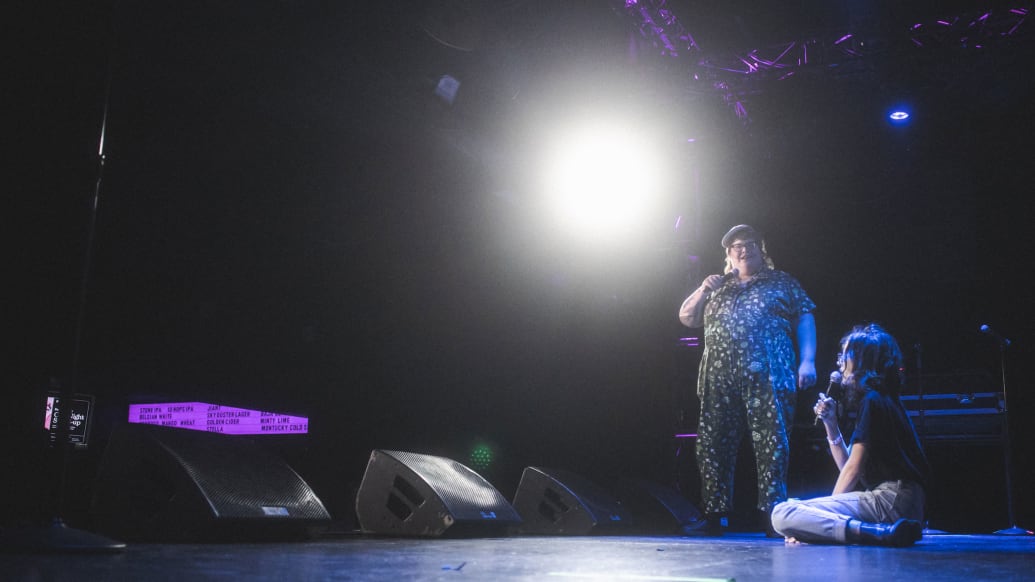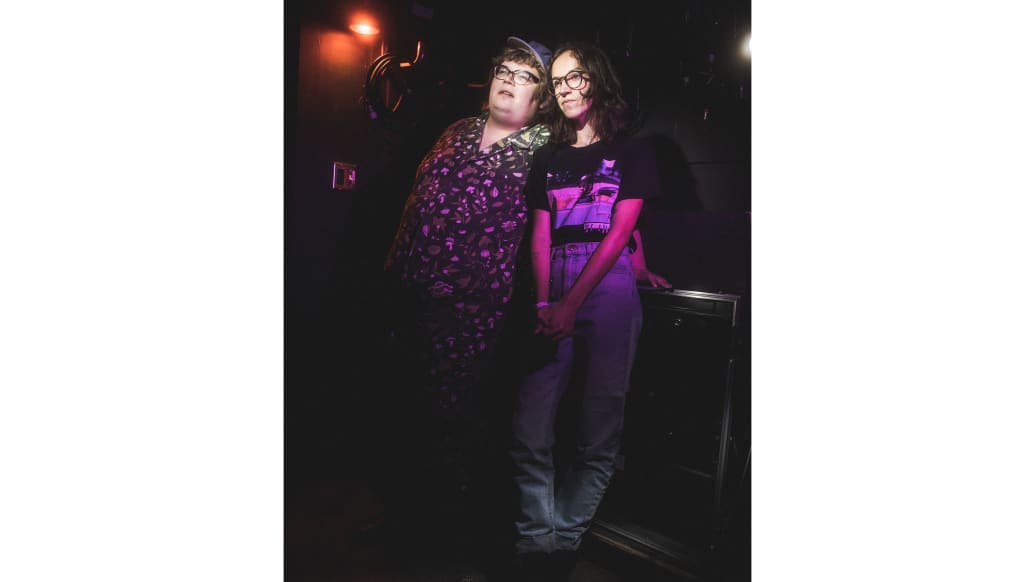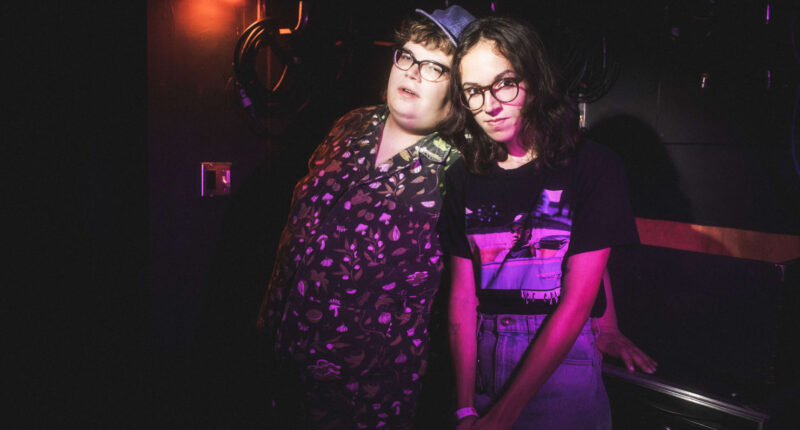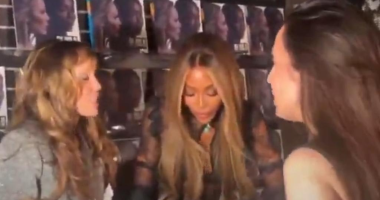The Gospel of Girl God – It’s May 2023, and I’ve just learned something shocking: At age 34, Matty Healy has finally had his first orgasm.
Normally, I would have zero interest in this, let alone consider it “news.” But Healy is all over the news at that moment, thanks to his much-derided relationship with Taylor Swift. It’s not just that he’s Swift’s “rebound,” a quick new fling after her breakup with longtime boyfriend Joe Alwyn. It’s that he’s also known for his intentionally regressive takes and sense of humor; he’s recently become maligned online for his appearance on the notorious Adam Friedland Show podcast, talking about his love for Ghetto Gaggers. (Do not look up what that is.)
But rising alt-comics Grace Freud and April Clark, who perform together as the alt-comedy duo Girl God, say the media’s gotten it all wrong.
“We’re dating Matty Healy,” announces Freud, “and he is the most progressive of the three of us, and honestly, that’s why we were planning on breaking up with him. But don’t tell him about this yet.”
The Gospel of Girl God, One of Comedy’s Wildest New Acts
Despite Healy’s reputation as a problematic, sensationalistic provocateur, Freud and Clark say he’s actually quite shy.
“He’s gotten further with us than he’s gotten with any other girls, which is saying something because we’ve only jacked him off,” Freud says bluntly. That’s not what turns them off, though; Matty’s so sensitive that Clark joking about his home country of the U.K. made him cry.

None of this is true, obviously. Very little of what Clark and Freud tell me over our two conversations—one in March, another in May—is true. In March, when we met up in a very loud coffee shop that closed 30 minutes into our conversation (my fault), Clark and Freud told me about how they were trying and failing to get addicted to drugs. (“You’re never gonna be a good comedian if you don’t fucking depend on substances more than you already do,” Clark explained at the time.) At various points, they said they were 34, 45, and 12 years old. They also claimed they were the inventors of sketch comedy, and that one of their comedy students went on to host Tosh.0.
Among all the other “facts” they left me to fact-check, the most obvious was that of their origin story.
“In some ways, we’ve been doing this our whole lives,” Clark said. “But in other ways, our first show was about a year and a half ago.”
Freud, immediately: “That was the first show we called ‘Girl God.’ But we’ve been performing together for about 30 years.”
Considering the two are, in actuality, 21 (Clark) and 29 (Freud), that was easy to poke holes through. Such is their comedy: highly involved bits that you better catch up to, lest you lose the plot altogether.
But what makes a journalist’s life hell is what makes a comedy fan fall so hard for Girl God. Their unpredictable, fast-paced banter is unlike many of their peers’; they’re liable to change the subject almost immediately, throwing in a wrench about how one of them created the other in a lab. It almost seems like they are operating on completely separate wavelengths, but they have fun in constantly playing catch-up with the other person’s brain.
One of my favorite stand-up sets in recent memory was when Freud appeared at “Dan + Joe + DVD Show,” a regular stand-up showcase at the Bell House in Brooklyn hosted by Dan Licata (a writer for Saturday Night Live) and Joe Pera (star of Joe Pera Talks with You). She’d lost her voice—it was not COVID, she assured us—but instead of bowing out, she invited a member of the audience to come onstage. She then whispered her material into their ear, forcing them to tell Freud’s jokes into the mic. It was as much fun watching the person sputter and balk at the idea of repeating deliberately graphic jokes about being gay and/or trans as it was to hear the punchlines themselves.
“I like the way Girl God has a laid-back approach to presenting chaos onstage,” Pera, who’s since been a supporting stand-up on Girl God’s own headlining bills, told me. “It’s always fun to watch Grace and April, because they’ve got such great rapport and it’s often hard to predict where things are going. That’s one of the things I appreciate most in comedy.”
Will Sennett, a friend and fellow comic who’s repeatedly opened for and performed with Girl God on tour, adds that their dynamic is “electric.” “They completely understand each other and the sort of characters they play on stage,” he says, “and are able to leverage that into constantly saying the exact right thing at the exact right time, in the funniest possible way.”

That’s what drew me to both of them ahead of that first show—a mix of individual stand-up and paired improv—which they hosted at Brooklyn’s Union Hall in December 2021. Even though they’d never performed together in person before, their chemistry was immediate and obvious. If you knew them from their social media, where they’ve each amassed large followings, it made sense that they meshed so well together.
I first encountered Freud in fall 2020, when a video she posted called “How many gay people are there?” went viral. (“I’ve always wanted to know, so I sat down and did the math.”) She polled three people on how many gay people they knew—150, 500, and one, they told her—then added in the number of gay people she knew, which she said was 10. I will not spoil the list, but it is… very surprising.
From there, Freud calculated that adding up all of these numbers and dividing by four meant that “the average person knows 165.25 gay people.” Multiply that by 7.6 billion people on Earth, and “that means there are about 1,256,000,000,000 gay people.”
Freud continued to post short videos like this groundbreaking work of mathematical genius, along with other jokes and one-liners. Eventually, she posted about professional updates, including writing Rick and Morty comics and joining the writing staff of The Eric Andre Show. (In March, Andre told me that he thinks “Grace and April are the next wave” of comedy; he also served as executive producer on a pilot that the duo hopes they can sell as a series.)
Clark’s online persona is similar—incredibly dry, a mix of in-character joke tweets and on-camera goofs. No wonder they clicked online before even working together, as they lived on opposite coasts (Clark in New York, Freud in Los Angeles). Their senses of humor online were so similar that it was a surprise to Freud that Clark wasn’t even performing when they first met in person.
Clark “was in a Ph.D. program in Women’s Studies” when she met Freud for drinks that first time, she said. “I’ve always done school, and I was gonna be a teacher.” But Freud started “giving me all this advice, as if she thought I was trying to do comedy. And then after a while, I was going along with it, because I was genuinely interested.”
“You were just so funny on Twitter,” Freud explained. “I thought you were trying to get into TV writing, so I just kind of was like, ‘This is what you could do.’ And then she’s like, ‘I don’t really do that.’ But I was like, ‘You’re so funny! You should try sometime!’”
Clark did her first stand-up set in Freud’s backyard later that year, at a regular comedy show she hosted. From there, she dropped out of her Ph.D., and the duo launched Girl God.
Even though they’ve only been performing live under the moniker—which, Freud tells me, “came to us in a moment of true connection to the divine feminine and marketability”—for 18 months or so, Girl God has already amassed a number of admirers; among those who joined them onstage at a recent show they hosted called “Gay Aid” were Lance Bangs and the guy behind Twitter personality Dril. On their first national tour, which concluded in May, they had several buzzy guests drop by, including Andre and actor/comedian John Early.
There’s a lot about Clark and Freud’s easy rapport that both comics and comedy fans find appealing, Sennett says.
“I think the most impressive thing about how they perform is their ability to do these shows that they’ve meticulously plotted and written out and make it all seem so casual and conversational,” Sennett adds, highlighting another surprising but key element to their humor. “I watched them perform the same show 20-plus times in a month and somehow they were able to make it seem like it was the first time every time.”
That live-show synergy is immediately obvious, and its plotting indeed surprising. When I saw them perform at a sold-out show last year at the Bell House, Severance star Zach Cherry popped by—to play a pedophile who had kidnapped Clark and Freud and forced them to host a late-night talk show in his basement, in which he appeared as their regular guest. They referred to him only as “the Master.”
If this very lacking description of this extremely funny bit already makes you laugh, then you’re on Girl God’s page, even if you don’t know it yet. And that Clark and Freud are able to mesh their loud-quiet dynamic together so well on stage seems like the kind of rare, blessed partnership all comics want to find.
Not all of Girl God’s bits are so high-concept. A video they posted in March, not long before we met, came in response to J.K. Rowling’s insistence on espousing transphobic sentiments all over the internet. Clark and Freud faced the camera and admitted perhaps their biggest wrongdoing: They’re the reason, they say, that Rowling is a transphobe.
They worked at the coffee shop where Rowling wrote the first Harry Potter book, they explained, and they decided to play a prank on her: They closed the coffee shop door on her as she was leaving, causing her to walk straight into it. The impact left her with brain damage that unlocked her latent transphobia.
Rallying against Rowling’s TERFdom is one of Girl God’s more personal-skewing pieces of comedy; both Clark and Freud are trans, which has come up in their act. But they reject the media’s knee-jerk desire to label them as “trans comedians” doing “trans comedy.”
“This is actually probably worth giving some level of an earnest answer,” Clark said, when I asked in March about how the expectation to play into their trans identities influences their work—a rare pause in the non-stop goofing off.
“Basically we don’t give a fuck about any of that,” Freud said. “We don’t care. We just wanna do jokes, you know? It’s not about identity.”
“It’s not because we’re better than that or whatever,” added Clark, before Freud continued.
“I think the point is, if what you want from comedy is validation of your identity, fine,” she said. “But that’s not what we want to do, right? So at the end of the day, we’re just not concerned with it.”

Still, in a social and entertainment landscape where trans people are at a constant disadvantage—if not actively persecuted—the fact that Clark and Freud continue to find success feels important. Freud also notably makes sure to not just keep things ironic online, especially now that she has a larger audience.
“I would like to not tweet seriously ever,” Freud says when we talk in May. “But I am OK with using my platform to be like, ‘Hey, you know, there should be accommodations for disabled people at this venue,’ or this or that. I think that’s cool.” She and Clark have also been especially vocal during the ongoing Writers Guild of America strike; both are members of the union, which is currently fighting for fair wages and protections from Big Hollywood.
But don’t be mistaken: “I do not want the comedy and art that we do to be like, ‘And this is what it means to be a good person,’” she adds.
With their recent efforts to cultivate a larger audience and indulge their existing fanbase, folks have more chances to learn the immoral truth of Girl God’s comedy. When we talk in May, they’ve just launched their Patreon. They’ve also started a podcast, The Girl God Experience, on the popular Earwolf network.
“When’s the best time to start a podcast?” asks Clark. “Answer number one is probably like 2015, 2016. Answer number two is probably, like, eight years later, when it’s not really, like, a cool new thing anymore.”
And if you’re going to start a podcast well past the podcast peak, you might as well ape from the “best”—The Girl God Experience, obviously, is a parody of Joe Rogan’s show.
To be clear, by “Joe Rogan’s show,” Clark and Freud mean Fear Factor.
“We are making our listeners confront their fears of dying,” says Freud. “I think what we are doing on The Girl God Experience is the ‘making hot women eat scorpions’ of audio storytelling.”
From listening, I’d define that type of storytelling as “deep, unbroken irony, bits, and character-building.” Your mileage may vary on how amusing this is for a sustained period of time in audio, but then, that’s the Girl God experience writ large. (Surely if you don’t care for Rogan-type provocation, even subversively, the tone may not be for you.)
While Clark and Freud occasionally invite a guest onto the podcast—like fellow indie comics Ivy Wolk and Felix Biederman, along with Early and Sennett—the overarching premise of each episode is hard to describe. Most recently, they covered such topics as climate change, racist cab drivers, anti-fascism, baby Hitler, and dating younger women. It is, frankly, incredibly hard to describe, but both Earwolf and their growing Patreon community know what they’re getting into when listening.
Sennett’s very funny analysis is also telling: “They’re going to be insanely famous and deserve to be,” he says of Freud and Clark, “which is unfortunate, because they will undoubtedly use their powers for evil and will rain down terror and destruction on us all.”
Aside from The Girl God Experience and their Patreon, the two are also embarking upon another nationwide tour, to further spread their morally dubious gospel. Their quest for comedy greatness is one I’d call honest, if it didn’t take me so long to fact-check.
But the truth is that Clark and Freud are fiercely committed to both each other and Girl God. At one point during our conversation, they shared an anecdote that I found sweet and representative of their relationship and the comedy that brings it in focus:
“When I lived in New York and Grace lived in L.A., we would regularly do this bit where whichever one of us was performing, the other one would call in,” Clark says, recounting that period in 2021 before she moved cross-country. “We would do Girl God live, but remotely,” telling jokes to the crowd on speakerphone.
“It was a blast,” she says. “We had a lot of fun ideas with that. We haven’t done that in a while.”
“Mainly because now we all live in one big house with our boyfriend Matt Healy,” Freud interjects.
And thus, I went back to fact-checking.
Post source: <a”>TDB</a”>
Last Updated on August 5, 2023 by 247 News Around The World







